Written on the Wind, 1956, directed by Douglas Sirk, screenplay by George Zuckerman, from the novel by Robert Wilder.
I thought that All That Heaven Allows was about as over-the-top as Sirk could get. I gravely underestimated him. The credits may claim that Written on the Wind is based on a novel by Robert Wilder, but it seems to me to be a film adaptation of the paperback rack at a low-end drugstore, circa 1956. Seriously, look at these three stills: all that's missing is the title and the Gold Medal Books logo:



As with All That Heaven Allows, the visual form fits the subject matter perfectly. Written on the Wind is not a static film about the suffocating middle classes, but a peep show of the morally depraved rich. The story was loosely based on the short life and violent death of Zachary Smith Reynolds, but Wilder moved the setting to Texas and changed the tobacco money to oil. Meet the scions of the Hadley family, world-famous for their vast oilfields and poorly-rotoscoped headquarters.
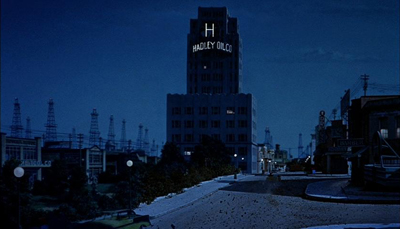
Robert Stack plays the prodigal son, Kyle. As you've probably guessed from everything you know about Sirk, it's not a particularly subtle performance. Kyle Hadley's defining characteristic is that he drinks too much. Well, there are drinkers and there are drunks. And then there are the sorts of people who cradle a bottle of corn liquor like a teddy bear:

And Kyle is actually the better of the two Hadley children. His sister Marylee is a drinker as well, but makes time to pick up working-class men out of boredom and spite. In 1956, the only thing more terrifying than a sexually aggressive woman who slept below her social class was Communism. Robert Stack sets the bar pretty high for overacting, but Dorothy Malone passes him by leaps and bounds. She's Iago in pink, dripping with contempt for everyone around her.

With those two performances, whatever the rest of the cast does seems like a waste of screen time. Rock Hudson plays Kyle's childhood friend ("Mitch Wayne," apparently because "Rock Hudson" was already taken). Mitch may be the son Mr. Hadley, Sr. always wanted, but he's pretty dull to watch. You get the impression Hudson knew he'd taken the wrong part.

Lauren Bacall doesn't fare much better as Kyle's wife Lucy. The script doesn't give her a lot of fireworks, but even so, her performance is consistently too drab for the movie she's in. It's as if she were trying to elevate the material with restraint.

To be fair, that strategy worked pretty well for Jane Wyman in All That Heaven Allows; she found an emotional center to her character and built something touching from ridiculous material. But Written On The Wind refuses to be elevated. Here's the plot, such as it is. Kyle and Mitch both love Lucy; Marylee has loved Mitch since childhood. Mitch, being Rock Hudson, has no interest in women like Marylee (slightly mannish women in grey suits, on the other hand...). So she keeps throwing herself at him and he keeps humiliating and rejecting her. After Lucy inexplicably marries Kyle, Marylee convinces her insecure brother that his wife is having an affair with Mitch. Mayhem and tragedy ensue. Stack and Malone knew exactly what kind of movie they were in, and fully, deliriously commit to their ridiculous roles. So they both got nominated for Best Supporting Actor/Actress Oscars and Hudson and Bacall got nothing.
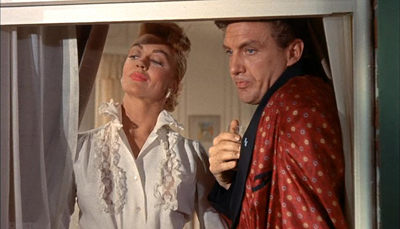
Sirk made them work for their nominations, though. When Robert Stack isn't staggering around drunk, he has this creepy dead-eyed stare that makes you wish he'd get back to drinking.
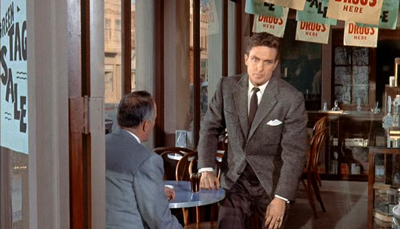
That's good enough for a nomination, but Dorothy Malone actually went home with a gold statue, and that takes a bit more. You couldn't make a Hollywood movie with a character like Marylee in 1956 unless she was going to be shamed, punished, and humiliated (you still can't, for the most part), so Malone has a pretty thankless acting task. But she sells it, at least some of the time. In the scene below, even with the ridiculous dialogue, even with the fact that she's coming on to Rock Hudson (who is playing a ukulele, for God's sake), she's sexier than she has any right to be.
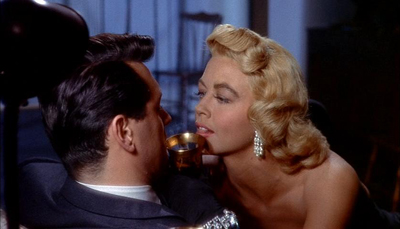
She fares less well when Sirk has her feign sexual ecstasy while remembering Mitch's childhood marriage proposal. Sirk has kid's voices on the soundtrack while Malone bites her lip and writhes.
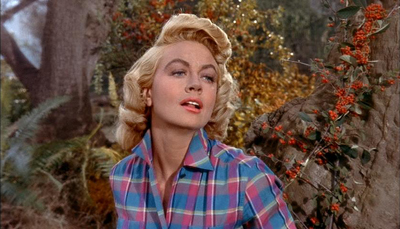
Sarah Bernhardt couldn't make that scene play.
Written on the Wind is directed with a lot less visual precision than All That Heaven Allows, but Sirk still clearly puts more effort into the picture's look than you'd expect in a melodrama. There's a carefully thought-out color scheme by which we can track Lauren Bacall's character, from the beginning where she is closer to Kyle:
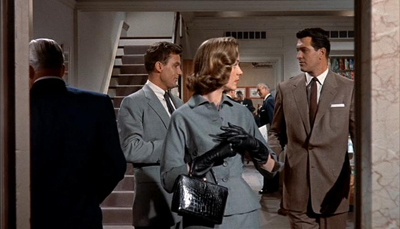
To later scenes when her sympathies lie with Mitch:

Still, there's nothing as disciplined or rigid as the lighting and framing effects of All That Heaven Allows. But that's appropriate, I suppose, because the film is much lighter and faster; anything that felt like a static tableau would slow it down. And both Robert Stack and Dorothy Malone are more fun to watch than anything in All That Heaven Allows (with the possible exception of Jacqueline deWit). So why do I think Written on the Wind is a less successful film? Because there's nothing as great as the television shot I wrote about in All That Heaven Allows.
Actually, that's not entirely true: there is a moment when, in a single shot, Sirk unifies all the themes he's been working with throughout the film. And here it is:
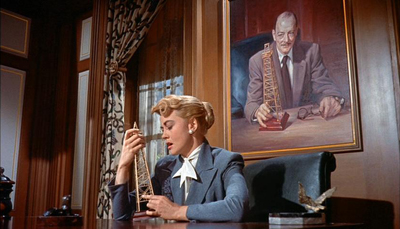
After Marylee loses her father, brother, and Mitch, she sits at her father's desk in a grey suit (her brother's color), caressing a model of an oil derrick. Behind her is a portrait of her father holding the same model, but with an air of confidence and mastery that Marylee lacks. It's all there: Kyle's fears of sterility and impotence, the Hadley children's inability to live up to their father's expectations, and most of all, the fact that Marylee has lost the man she loves, the embodiment of the film's masculine virtues.
But while the shot of Jane Wyman entombed in her television screen was both funny and kind of horrifying, in this case the phallic pun overshadows everything else. Maybe Sirk really did try to make a sincere "film about failure," as he put it. Maybe I'm missing something human and tragic in Robert Stack's performance. And maybe I just can't get past dick jokes. But to me, this film represents the kind of filmmaking Sirk transcended in All That Heaven Allows, what Sarris called a "joke by a fellow sophisticate revenging himself on... a mass audience too naive to realize it was being insulted." I'm okay with that kind of movie. I get the joke. Is that all there is?
Randoms:
- The best hilarious-shot-played-straight in the film happens right after Kyle is told that he may never have children. He leaves the drugstore where he's met the doctor, and has to walk out past a kid maniacally bouncing up and down on a mechanical horse:

- A still doesn't really capture how long the camera lingers on this kid bouncing up and down; Robert Stack earned his Academy Award nomination right there for not cracking up.
- I think Criterion may have erred in choosing All That Heaven Allows and Written on the Wind as their representative Sirk titles. One of the DVD supplements informs me that Sirk also made a film called Sign of the Pagan in which Jack Palance plays Atilla the Hun and, better yet, a 3-D Western starring Rock Hudson a an Apache.

